高中英语:必修一unit3 课本、教材(人教版)
- 格式:doc
- 大小:93.50 KB
- 文档页数:9

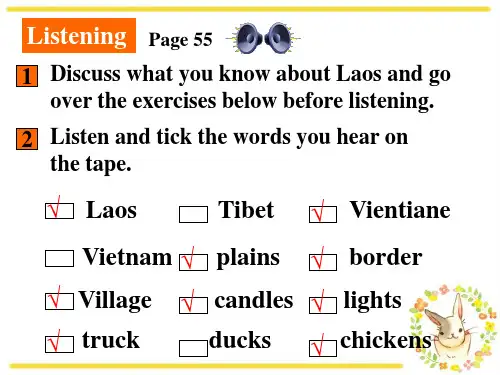
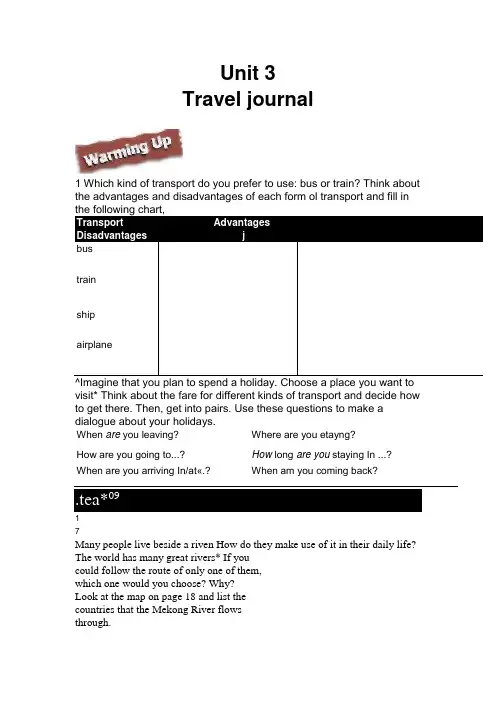
Unit 3Travel journal1 Which kind of transport do you prefer to use: bus or train? Think about the advantages and disadvantages of each form ol transport and fill in the following chart,Transport AdvantagesDisadvantages jbustrainshipairplane^Imagine that you plan to spend a holiday. Choose a place you want to visit* Think about the fare for different kinds of transport and decide how to get there. Then, get into pairs. Use these questions to make a dialogue about your holidays.When are you leaving? Where are you etayng?How are you going to...? How long are you staying In ...? When are you arriving In/at«.? When am you coming back?.tea*0917Many people live beside a riven How do they make use of it in their daily life? The world has many great rivers* If youcould follow the route of only one of them,which one would you choose? Why?Look at the map on page 18 and list thecountries that the Mekong River flowsthrough.17Unit 3 Travel journalJOURNEY DOWN THE MEKONQPm i THE. DRUM AND THE PUNI My name is Wang Kun. Ever since middle school, my sister Wang Wei and 1 have dreamed about taking a great bike trip. Two years ago she bought an expensive mountain bike and then she persuaded 5 me to buy one. Last year, she visited our cousins, Dao Wei and Yu Hang at their college in Kunming. They are Dai and grew up in western Yunnan Province near the Lancang River, the Chinese pan of the river that is called the Mekong River in other countries. to Wang Wei soon got them interested in cycling too. After graduating from college, we finally got the chance to take a bike trip. I asked my sister, "Where are we going?" It was my sister who first had the idea to cycle along the entire Mekong River from where it15 begins to where it ends- Now she is planning our schedule for the trip.I am fond of my sister but she has one serious shortcoming. She can be really stubborn. Although she didn't know the best way of gettingto places, she insisted that she organize the trip properly. Now* I know thai the proper way is always her way, I kept asking her, "When are we leaving and when are we coming back?" I asked her whether she had looked at a map yet. Of20 course she hadn't; my sister doesn*t care about details. So I told her that the source of the Mekong is in Qinghai Province. She gave me a determined look - the kind that said she would not change her mind. When I told her that our Journey would begin at an altitude of more than 5,000 metres, she seemed to be excited about it. When I told her the air would be hard to breathe and it would be very cold, she said it would be an interesting experience. I know my sister well.25 Once she has made up her mind, nothing can change it* Finally, I had to give in.Several months before our trip, Wang Wei and 1 went to the library- We found a large atlas with good maps that showed details of world geography. From the atlas we could see that the Mekong River begins in a glacier on a Tibetan mountain. At first the river is small and the water is clear and cold. Then itbegins to move quickly- It becomes rapids as it passes through deep30 valleys, travelling across western Yunnan Province. Sometimes the river becomes a waterfall and emers wide valleys. We were both surprised to learn that half of the river is in China. After it leaves China and high altitude, the Mekong becomes wide, brown and warm. As it enters Southeast Asia, its pace slows. It makes wide bends or meanders through low valleys to the plains where rice grows. At last, the river delta enters the South China Sea. fteadW)18Unit 3 Travel jovrn&lComprehendingRead the passage carefully and answer the following questions.1 What was Wang Kun and Wang Wei's idea of a good trip?2 Who planned ihe trip to the Mekong?3 Where is the source of the Mekong and which sea does it enter?4 What can you see when you travel along the Mekong?What difficulties did Wang Kun and Wang Wei find about their journey? 6 What do you think about Wang Kun and Wang Wei?2 Look at the following sentences from the text and explain them in your own words.1 She gave me a determined look - the kind that said that she would not change her mind.2 ... my sister does not care about details.3 It makes wide bends or meanders through low valleys to the plains where rice grows.3 An attitude is what a person thinks about something. Write down Wang Wet's and Wang Kun's attitude to the trip. Then add your own opinion.Wang Wei's attitudeWang Kun's attitudeMy attitude4 Work in pairs. Imagine that you are Wang Kun and Wang Wei. Choose a paragraph from the passage and use the information to help you make up a dialogue.WANG WEI: You know* we\e always wanted to do a long hike trip. Why don) we go on oneafter we graduate from college? WANG KUN: That's a good idea....5 Compare the following sentences with different stresses and explain the meaning, EXAMPLE: We were both surprised to learn that half the river is in China.—* Not only my sister, but also I was surprised to learn that.We were both surprised to learn that half the river is in China. We were both surprised to learn that half the river is in China. We were both surprised to learn that half the river is in China.19Unit 3 Travel journalDiscovering useful words and expressionsFind the correct words or expressions from the text for each sentence.1 He is so stubborn that no one can him to do anything.2 A person always tries to finish the job, no matter how hard it is. My grandpa fishing and sometimes he fishes all day in the river. Liu Xiaoding is a good teacher and his students very much. I the red dress to the green one because it fits me better The concert went like clockwork because Li Pei hadit so wclLI wanted to pay the train 8 She persuaded all of us to. but my friend insisted. Finally I to work instead of taking the bus.12 Choose the correct words or phrases to complete the sentences.As neither of them would, no decision was taken that day. (give in / give up)I _the first flat we saw because it was larger, (like... better / prefer... to)The task was difficult, but Helen's expression let me knowthat she would not giveup. (stubborn / determined)4 The list of gifts was very long, and we don't know why, but the most important p the golden cup. was forgotten, (detail / item)5 "How I wish I could make a into space and see the stars up close!" cried Sarah, (journey / voyage)0 When he returned from his successful climb of Mount Qomolongma, Andrew finished his travel(journal / diary) and gave it to the newspaper.She had only one: she was very stubborn, (disadvantage / shortcoming)8 The very first time that Joe saw the film "ET" directed by Steven Spielberg, he tobecome a director too. (make up one's mind / change one's mind)3 Complete this passage with some of the following words.rapids glacier mountain delta plain valleywaterfall bank1 really enjoyed my school field trip in geography two months ago. We saw so many beautiful things; a that flowed like a river of ice through a that cut the mountains into two parts. We also discovered a river that was falling off the mountain and became awonderful . This was even more exciting to see than the where the waterseemed to boll. loiter we followed the river to a quieter and the sea.and finally into a20Unit 3 Travel jovrn&lDiscovering useful structures1 Look at the questions in the Warming Up again. They are in the present continuous tense but they express future actions* Can you find similar sentences from the reading passage?2 In the following dialogue, a newspaper reporter is interviewing Wang Wei about her ptans for the trip along the Mekong River, However, they are not sure about some of the verb tenses. Please complete their conversation.R: Miss Wang. I hear that you(travel) along the Mekong Riven Have you goteverything ready? W: Almost.R: So when you(leave)? W: Next Monday.R: How far you_ (cycle) each day?W: It's hard to say. If the weather is fine, I think we'll be able to ride 75 km a day. R: What about the weather in Qinghai Province? W; Die weatherforecast is not good so we(take) a large parcel of warm clotheswith us,R: Where__________you__________(stay) at night?W: Usually in our tent, but sometimes in the villages along the river bank.R: What happens if you have an accident?\Y Don't worry. I had some medical training at my college. Besides* we (take) outinsurance to cover any problems. R: Well, it sounds fun. I hope you'll have a pleasant journey. Thank you for your time.3 You have got some plans tor the future. Use the present continuous tense to express your future actions. Give as much information as you can.EX AMPLE: (this evening) I'm going out this evening, fVm not doing anything this evening. / I don) know what Vm doing this evening.1 (tomorrow morning) _2 (the day aftertomorrow)____________________________________________________3 (next Saturday evening)4 (next month)21Unit 3 Travel journalJOURNEY DOWN THE MEKONQPMtt E A MIGHT IN THE MOUNTMNSAlthough it was autumn, the snow was already beginning to fall in Tibet, Our legs were so heavy and cold that they felt like blocks of ice- Have you ever seen snowmen ride bicycles? That's what we looked like! Along the way children dressed in long wool coats stopped to look at us. In the late afternoon we found it was so cold that our water bottles froze. However, the lakes shone like glass in the setting sun and looked wonderful. Wang Wei rode in front of me as usual. She is very reliable and I knew I didn't need to encourage hen To climb the mountains was hard work but as we looked around us, we were surprised by the view. We seemed to be able to sec for miles. At one point we were so high that we found ourselves cycling through clouds. Then we begangoing down the hills. It was great fun especially as it gradually became much warmer In the valleys colourful butterflies flew around us and we saw many yaks and sheep eating green grass. At this point we had to change our caps, coats, gloves and trousers for T-shirts and shorts.In the early evening we always stop to make camp. We put up our tent and then we eat. After supper Wang Wei put her head down on her pillow and went to sleep but I stayed awake. At midnight the sky became clearer and the stars grew brighter. It was so quiet. There was almost no wind - only the flames of our fire for company. As I lay beneath the stars I thought about how far we had already travelled.We will reach Dali in Yunnan Province soon, where our cousins Dao Wei and Yu Hang will join us. We can hardly wait to see them!JjRead the passage above and discuss these questions in pairs.1 What items are Wang Kun and Wang Wei carrying with them? What do you think they will have to leave behind in Dali? What should thev take instead?2 How does Wang Kun feel about the trip now? What do you think changed his mind?2 Imagine that in the morning there is a dialogue between Wang Kun and Wang Wei, What do you think they would say before they leave camp?jjjListen to the tape and mark the rising and falling tone of each sense group and sentences from "To climb the mountains ..." to "... T-shirts and shorts". Then practise reading it aloud.22Unit 3 Travel jovrn&lListening and speaking illBefore you listen, read the exercises below and try to predict what the listening is about2 Listen to the tape and tick the statement which tells the main idea of the dialogue.A A girl from Laos told Wang Kun about how Laotians use the Mekong River.B A girl told Wang Kun a bom what they would see along the Mekong River.C A girl from Laos told Wang Kun about how important and beautiful the Mekong is.Listen again and complete the passage below*The Mekong is the most important river in Laos. It eventhe country- l^iotian people use the river for—* «people around the country. They call the Mekong "thecall it "the water of the". If you follow the river in Laos, you can visit temples, cavesand a, At night, you can sleep in some smallby the river.on the national ofand goods andof Laos**, but in Tibet peopleWhat else would you expect Wang Kun and the girl to talk about? Get into pairs and continue the dialogue between them. Use the following expressions to end your conversation.Have a nice/good time. Have fun. Say hello to....Have a rAcefqood crip.Take cans.Good luck oti your Journey.Wrlttf to me.Give my love / best wi&hee to....Beet w)ehe&WritingImagine that you are a friend of Wang Kun* Write a short email asking about Laos*# In pairs brainstorm some questions. EXAMPLEWhat is tlwfood like in Laos? What do you think of the country?• Choose two or three questions and use each as a new paragraph.How was your trip?What did you do when ...?Have you met...?When did you get back?What kind of things did you see?Could you give me more details about (7)Could you tell me about...?23Unit 3 Travel journalYou can start your email like this.Addresses w Calendar Send SNotepadSave as o DroMSpell Cho<k CancelIo:| Cc: Subject:Wang Kuii1About Lao*My dear brave Wang Kun,How are you theee daye? 1 tosep wondering how you feel about.... Your friend forever,JUMM1NO UPLUrite doom oihot you hove leorned obout travelling.from this unit you hove olso Icorned • useful verbs;___________________useful nouns:other expressions:o new grammar item:LEARNING TIPWhen you go On a journey, why not keep a travel journal? There are always so many new people to meet and interesting things to see. Describe them and the scenery in your travel journal as if you are writing to a friend who has never seen them. You may be teaching yourself a whole new job, as many people enjoy reading about journeys and seeing the world through somebody else's eyes*TO WANG LUNbyliBaiI was about to sail away in a jutk.When suddenly I heardThe sound of stamping and singing on the bank -Tt was you andyoir friends come to bid me farewellThePeoch Flower Lake is a thousand fathoms deep.But it cannot compare, O Wang Lin,with the depth of your love for me.24。
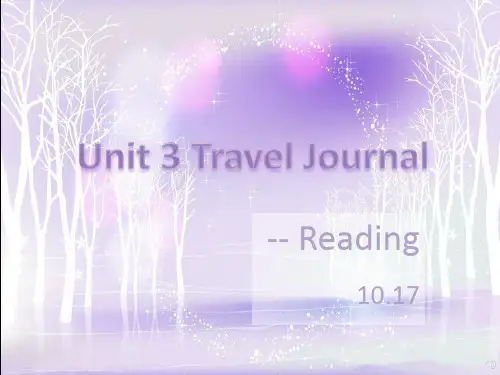
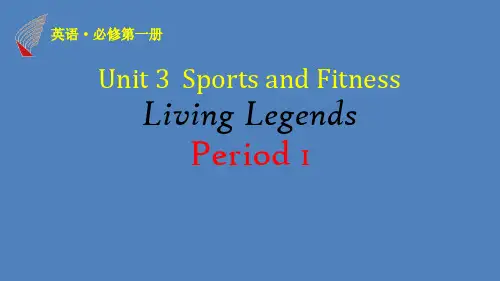
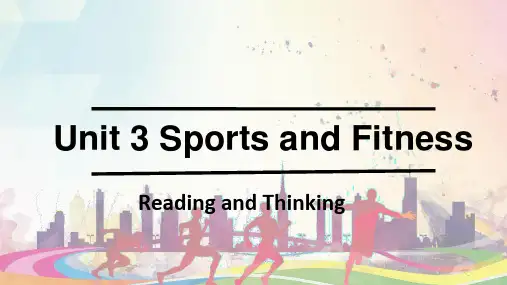
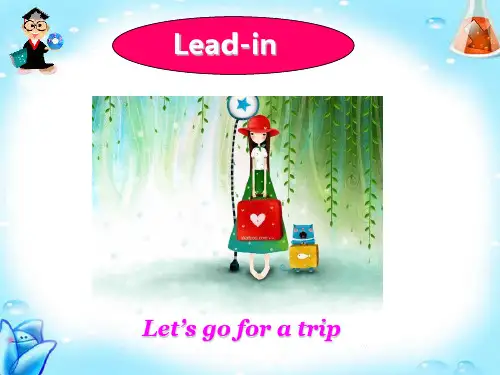
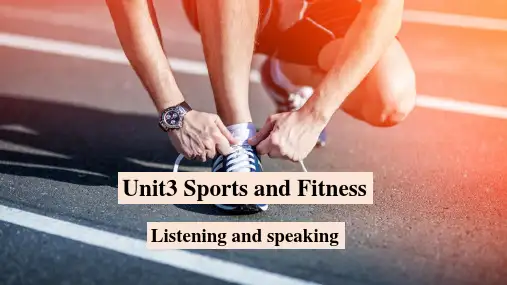
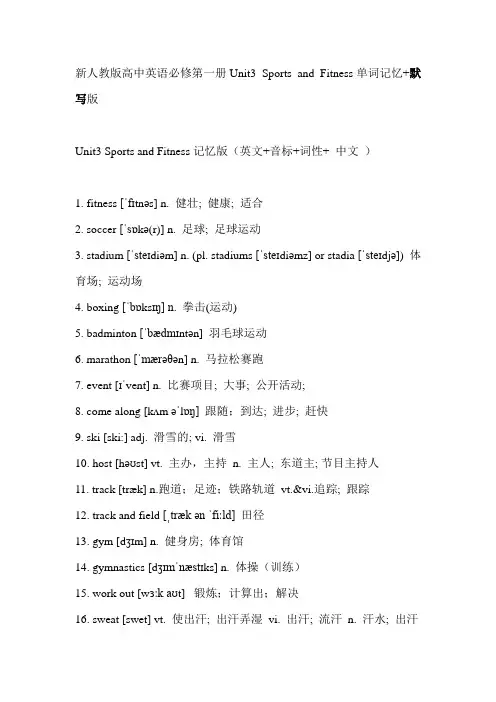
新人教版高中英语必修第一册Unit3 Sports and Fitness单词记忆+默写版Unit3 Sports and Fitness记忆版(英文+音标+词性+ 中文)1. fitness [ˈfɪtnəs] n. 健壮; 健康; 适合2. soccer [ˈsɒkə(r)] n. 足球; 足球运动3. stadium [ˈsteɪdiəm] n. (pl. stadiums [ˈsteɪdiəmz] or stadia [ˈsteɪdjə]) 体育场; 运动场4. boxing [ˈbɒksɪŋ] n. 拳击(运动)5. badminton [ˈbædmɪntən] 羽毛球运动6. marathon [ˈmærəθən] n. 马拉松赛跑7. event [ɪˈvent] n. 比赛项目; 大事; 公开活动;8. come along [kʌm əˈlɒŋ] 跟随;到达; 进步; 赶快9. ski [ski:] adj. 滑雪的; vi. 滑雪10. host [həʊst] vt. 主办,主持n. 主人; 东道主; 节目主持人11. track [træk] n.跑道;足迹;铁路轨道vt.&vi.追踪; 跟踪12. track and field [ˌtræk ən ˈfiːld] 田径13. gym [dʒɪm] n. 健身房; 体育馆14. gymnastics [dʒɪmˈnæstɪks] n. 体操(训练)15. work out [wɜːk aʊt] 锻炼;计算出;解决16. sweat [swet] vt. 使出汗; 出汗弄湿vi. 出汗; 流汗n. 汗水; 出汗17. make it [meɪk ɪt] 获得成功;准时到达18. legend [ˈledʒənd] n.传奇故事(或人物);传说19. athlete [ˈæθliːt] n. 运动员; 运动健儿20. master [ˈmɑːstə(r)] n. 高手;主人vt. 精通; 掌握21. set an example [set ən ɪɡˈzɑːmpl] 树立榜样22. honour [ˈɒnə(r)] n. 荣誉;尊敬;荣幸23. glory [ˈɡlɔːri] n. 荣誉; 光荣; 赞美24. medal [’medl] n. 奖章; 勋章25. championship [ˈtʃæmpiənʃɪp] n. 锦标赛; 冠军赛;冠军称号26. champion [ˈtʃæmpiən] n.冠军;优胜者27. determination [dɪˌtɜːmɪˈneɪʃn] n. 决心; 决定28. apart [əˈpɑːt] adv. 分离; 分开; 成碎片29. fall apart [fɔːl əˈpɑːt] 破裂; 破碎; 崩溃30. injure [ˈɪndʒə(r)] vt. 使受伤; 损害31. injured [ˈɪndʒəd] adj. 受伤的; 有伤的32. injury [ˈɪndʒəri] n. 伤害;损伤33. captain [ˈkæptɪn] n. (运动队) 队长; 船长; 机长34. lose heart [luːz hɑːt] 丧去信心; 泄气35. graceful [ˈɡreɪsfl] adj. 优美的; 优雅的36. strength [streŋθ] n. 力量; 体力37. failure [ˈfeɪljə(r)] n. 失败; 失败的人(或事物)38. give up [ɡɪv ʌp] 放弃; 投降39. compete [kəmˈpiːt] vi. 竞争; 对抗40. make sense [meɪk sens] 有道理;合乎情理; 表达清楚41. pretend [prɪˈtend] vi.&vt. 假装; 装扮42. pretend to do [prɪˈtend tu duː] sth. 假装做某事43. even if [ˈiːvn ɪf] (= even though [ˈiːvn ðəʊ]) 即使; 虽然44. million [ˈmɪljən] num. 一百万45. cheat [tʃiːt] vi. 作弊,舞弊vt. 欺骗; 蒙骗n.欺骗手段; 骗子46. audience [ˈɔːdiəns] n. 观众; 听众47. positive [ˈpɒzətɪv] adj. 积极的;正面的;乐观的;肯定的48. slim [slim] adj. 苗条的; 单薄的49. diet [ˈdaɪət] n.规定饮食;日常饮食vi. 节食50. make a difference [meɪk əˈdɪfrəns] 有作用或影响51. rather [ˈrɑːðə(r)] adv. 相当; 有点儿52. rather than [ˈrɑːðə(r) ðæn] 而不是53. push-up [ˈpʊʃʌp] n. 俯卧撑54. cut … out [ˈkʌt aʊt] 停止做(或使用、使用);剪下55. now and then [naʊənd ðen]有时; 偶尔56. compare … with/to …[kəmˈpeə(r) wɪð/tu]与……比较57. jog [dʒɒɡ] vi. 慢跑n. 慢跑58. stress [stres] n. 错误;差错新人教版高中英语必修第一册Unit3 Sports and Fitness单词默写版Unit3 Sports and Fitness记忆版(英文+音标+词性+ 中文)1. ________ [ˈfɪtnəs] n. 健壮; 健康; 适合2. ________ [ˈsɒkə(r)] n. 足球; 足球运动3. ________ [ˈsteɪdiəm] n. (pl. ________ [ˈsteɪdiəmz] or ________ [ˈsteɪdjə]) 体育场; 运动场4. ________ [ˈbɒksɪŋ] n. 拳击(运动)5. ________ [ˈbædmɪntən] 羽毛球运动6. ________ [ˈmærəθən] n. 马拉松赛跑7. ________ [ɪˈvent] n. 比赛项目; 大事; 公开活动;8. (词组)________ ________ [kʌm əˈlɒŋ] 跟随;到达; 进步; 赶快9. ________ [ski:] adj. 滑雪的; vi. 滑雪10. ________ [həʊst] vt. 主办,主持n. 主人; 东道主; 节目主持人11. ________ [træk] n.跑道;足迹;铁路轨道vt.&vi.追踪; 跟踪12. (词组)________ ________ ________ [ˌtræk ən ˈfiːld] 田径13. ________ [dʒɪm] n. 健身房; 体育馆14. ________ [dʒɪmˈnæstɪks] n. 体操(训练)15. (词组)________ ________ [wɜːk aʊt] 锻炼;计算出;解决16. ________ [swet] vt. 使出汗; 出汗弄湿vi. 出汗; 流汗n. 汗水; 出汗17. (词组)________ ________ [meɪk ɪt] 获得成功;准时到达18. ________ [ˈledʒənd] n.传奇故事(或人物);传说19. ________ [ˈæθliːt] n. 运动员; 运动健儿20. ________ [ˈmɑːstə(r)] n. 高手;主人vt. 精通; 掌握21. (词组)________ ________ ________ [set ən ɪɡˈzɑːmpl] 树立榜样22. ________ [ˈɒnə(r)] n. 荣誉;尊敬;荣幸23. ________ [ˈɡlɔːri] n. 荣誉; 光荣; 赞美24. ________ [’medl] n. 奖章; 勋章25. ________ [ˈtʃæmpiənʃɪp] n. 锦标赛; 冠军赛;冠军称号26. ________ [ˈtʃæmpiən] n.冠军;优胜者27. ________ [dɪˌtɜːmɪˈneɪʃn] n. 决心; 决定28. ________ [əˈpɑːt] adv. 分离; 分开; 成碎片29. (词组)________ ________ [fɔːl əˈpɑːt] 破裂; 破碎; 崩溃30. ________ [ˈɪndʒə(r)] vt. 使受伤; 损害31. ________ [ˈɪndʒəd] adj. 受伤的; 有伤的32. ________ [ˈɪndʒəri] n. 伤害;损伤33. ________ [ˈkæptɪn] n. (运动队) 队长; 船长; 机长34. (词组)________ ________ [luːz hɑːt] 丧去信心; 泄气35. ________ [ˈɡreɪsfl] adj. 优美的; 优雅的36. ________ [streŋθ] n. 力量; 体力37. ________ [ˈfeɪljə(r)] n. 失败; 失败的人(或事物)38. (词组)________ ________ [ɡɪv ʌp] 放弃; 投降39. ________ [kəmˈpiːt] vi. 竞争; 对抗40. (词组)________ ________ [meɪk sens] 有道理;合乎情理; 表达清楚41. ________ [prɪˈtend] vi.&vt. 假装; 装扮42. (词组)________ ________ ________ ________ [prɪˈtend tu duː] sth. 假装做某事43. (词组)________ ________ (=________ ________ [ˈiːvn ðəʊ]) [ˈiːvn ɪf] 即使; 虽然44. ________ [ˈmɪljən] num. 一百万45. ________ [tʃiːt] vi. 作弊,舞弊vt. 欺骗; 蒙骗n.欺骗手段; 骗子46. ________ [ˈɔːdiəns] n. 观众; 听众47. ________ [ˈpɒzətɪv] adj. 积极的;正面的;乐观的;肯定的48. ________ [slim] adj. 苗条的; 单薄的49. ________ [ˈdaɪət] n.规定饮食;日常饮食vi. 节食50. (词组)________ ________ ________ [meɪk əˈdɪfrəns] 有作用或影响51. ________ [ˈrɑːðə(r)] adv. 相当; 有点儿52. (词组)________ ________ [ˈrɑːðə(r) ðæn] 而不是53. ________ [ˈpʊʃʌp] n. 俯卧撑54. (词组)________ ________ [ˈkʌt aʊt] 停止做(或使用、使用);剪下55. (词组)________ ________ [naʊənd ðen]有时; 偶尔56. (词组)________ …________ …[kəmˈpeə(r) wɪð/tu]与……比较57. ________ [dʒɒɡ] vi. 慢跑n. 慢跑58. ________ [stres] n. 错误;差错。
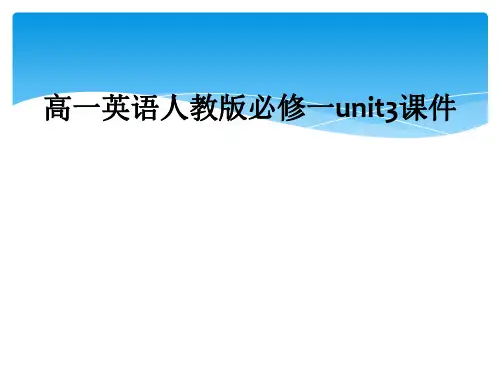
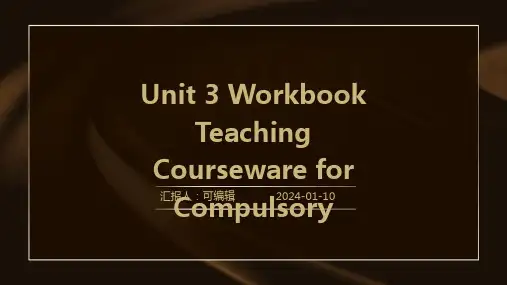
Unit 3Travel journal1 Which kind of transport do you prefer to use: bus or train? Think about the advantages and disadvantages of each form ol transport and fill in the following chart,Transport AdvantagesDisadvantages jbustrainshipairplane^Imagine that you plan to spend a holiday. Choose a place you want to visit* Think about the fare for different kinds of transport and decide how to get there. Then, get into pairs. Use these questions to make a dialogue about your holidays.When are you leaving? Where are you etayng?How are you going to...? How long are you staying In ...? When are you arriving In/at«.? When am you coming back?.tea*0917Many people live beside a riven How do they make use of it in their daily life? The world has many great rivers* If youcould follow the route of only one of them,which one would you choose? Why?Look at the map on page 18 and list thecountries that the Mekong River flowsthrough.17Unit 3 Travel journalJOURNEY DOWN THE MEKONQPm i THE. DRUM AND THE PUNI My name is Wang Kun. Ever since middle school, my sister Wang Wei and 1 have dreamed about taking a great bike trip. Two years ago she bought an expensive mountain bike and then she persuaded 5 me to buy one. Last year, she visited our cousins, Dao Wei and Yu Hang at their college in Kunming. They are Dai and grew up in western Yunnan Province near the Lancang River, the Chinese pan of the river that is called the Mekong River in other countries. to Wang Wei soon got them interested in cycling too. After graduating from college, we finally got the chance to take a bike trip. I asked my sister, "Where are we going?" It was my sister who first had the idea to cycle along the entire Mekong River from where it15 begins to where it ends- Now she is planning our schedule for the trip.I am fond of my sister but she has one serious shortcoming. She can be really stubborn. Although she didn't know the best way of gettingto places, she insisted that she organize the trip properly. Now* I know thai the proper way is always her way, I kept asking her, "When are we leaving and when are we coming back?" I asked her whether she had looked at a map yet. Of20 course she hadn't; my sister doesn*t care about details. So I told her that the source of the Mekong is in Qinghai Province. She gave me a determined look - the kind that said she would not change her mind. When I told her that our Journey would begin at an altitude of more than 5,000 metres, she seemed to be excited about it. When I told her the air would be hard to breathe and it would be very cold, she said it would be an interesting experience. I know my sister well.25 Once she has made up her mind, nothing can change it* Finally, I had to give in.Several months before our trip, Wang Wei and 1 went to the library- We found a large atlas with good maps that showed details of world geography. From the atlas we could see that the Mekong River begins in a glacier on a Tibetan mountain. At first the river is small and the water is clear and cold. Then itbegins to move quickly- It becomes rapids as it passes through deep30 valleys, travelling across western Yunnan Province. Sometimes the river becomes a waterfall and emers wide valleys. We were both surprised to learn that half of the river is in China. After it leaves China and high altitude, the Mekong becomes wide, brown and warm. As it enters Southeast Asia, its pace slows. It makes wide bends or meanders through low valleys to the plains where rice grows. At last, the river delta enters the South China Sea. fteadW)18Unit 3 Travel jovrn&lComprehendingRead the passage carefully and answer the following questions.1 What was Wang Kun and Wang Wei's idea of a good trip?2 Who planned ihe trip to the Mekong?3 Where is the source of the Mekong and which sea does it enter?4 What can you see when you travel along the Mekong?What difficulties did Wang Kun and Wang Wei find about their journey? 6 What do you think about Wang Kun and Wang Wei?2 Look at the following sentences from the text and explain them in your own words.1 She gave me a determined look - the kind that said that she would not change her mind.2 ... my sister does not care about details.3 It makes wide bends or meanders through low valleys to the plains where rice grows.3 An attitude is what a person thinks about something. Write down Wang Wet's and Wang Kun's attitude to the trip. Then add your own opinion.Wang Wei's attitudeWang Kun's attitudeMy attitude4 Work in pairs. Imagine that you are Wang Kun and Wang Wei. Choose a paragraph from the passage and use the information to help you make up a dialogue.WANG WEI: You know* we\e always wanted to do a long hike trip. Why don) we go on oneafter we graduate from college? WANG KUN: That's a good idea....5 Compare the following sentences with different stresses and explain the meaning, EXAMPLE: We were both surprised to learn that half the river is in China.—* Not only my sister, but also I was surprised to learn that.We were both surprised to learn that half the river is in China. We were both surprised to learn that half the river is in China. We were both surprised to learn that half the river is in China.19Unit 3 Travel journalDiscovering useful words and expressionsFind the correct words or expressions from the text for each sentence.1 He is so stubborn that no one can him to do anything.2 A person always tries to finish the job, no matter how hard it is. My grandpa fishing and sometimes he fishes all day in the river. Liu Xiaoding is a good teacher and his students very much. I the red dress to the green one because it fits me better The concert went like clockwork because Li Pei hadit so wclLI wanted to pay the train 8 She persuaded all of us to. but my friend insisted. Finally I to work instead of taking the bus.12 Choose the correct words or phrases to complete the sentences.As neither of them would, no decision was taken that day. (give in / give up)I _the first flat we saw because it was larger, (like... better / prefer... to)The task was difficult, but Helen's expression let me knowthat she would not giveup. (stubborn / determined)4 The list of gifts was very long, and we don't know why, but the most important p the golden cup. was forgotten, (detail / item)5 "How I wish I could make a into space and see the stars up close!" cried Sarah, (journey / voyage)0 When he returned from his successful climb of Mount Qomolongma, Andrew finished his travel(journal / diary) and gave it to the newspaper.She had only one: she was very stubborn, (disadvantage / shortcoming)8 The very first time that Joe saw the film "ET" directed by Steven Spielberg, he tobecome a director too. (make up one's mind / change one's mind)3 Complete this passage with some of the following words.rapids glacier mountain delta plain valleywaterfall bank1 really enjoyed my school field trip in geography two months ago. We saw so many beautiful things; a that flowed like a river of ice through a that cut the mountains into two parts. We also discovered a river that was falling off the mountain and became awonderful . This was even more exciting to see than the where the waterseemed to boll. loiter we followed the river to a quieter and the sea.and finally into a20Unit 3 Travel jovrn&lDiscovering useful structures1 Look at the questions in the Warming Up again. They are in the present continuous tense but they express future actions* Can you find similar sentences from the reading passage?2 In the following dialogue, a newspaper reporter is interviewing Wang Wei about her ptans for the trip along the Mekong River, However, they are not sure about some of the verb tenses. Please complete their conversation.R: Miss Wang. I hear that you(travel) along the Mekong Riven Have you goteverything ready? W: Almost.R: So when you(leave)? W: Next Monday.R: How far you_ (cycle) each day?W: It's hard to say. If the weather is fine, I think we'll be able to ride 75 km a day. R: What about the weather in Qinghai Province? W; Die weatherforecast is not good so we(take) a large parcel of warm clotheswith us,R: Where__________you__________(stay) at night?W: Usually in our tent, but sometimes in the villages along the river bank.R: What happens if you have an accident?\Y Don't worry. I had some medical training at my college. Besides* we (take) outinsurance to cover any problems. R: Well, it sounds fun. I hope you'll have a pleasant journey. Thank you for your time.3 You have got some plans tor the future. Use the present continuous tense to express your future actions. Give as much information as you can.EX AMPLE: (this evening) I'm going out this evening, fVm not doing anything this evening. / I don) know what Vm doing this evening.1 (tomorrow morning) _2 (the day aftertomorrow)____________________________________________________3 (next Saturday evening)4 (next month)21Unit 3 Travel journalJOURNEY DOWN THE MEKONQPMtt E A MIGHT IN THE MOUNTMNSAlthough it was autumn, the snow was already beginning to fall in Tibet, Our legs were so heavy and cold that they felt like blocks of ice- Have you ever seen snowmen ride bicycles? That's what we looked like! Along the way children dressed in long wool coats stopped to look at us. In the late afternoon we found it was so cold that our water bottles froze. However, the lakes shone like glass in the setting sun and looked wonderful. Wang Wei rode in front of me as usual. She is very reliable and I knew I didn't need to encourage hen To climb the mountains was hard work but as we looked around us, we were surprised by the view. We seemed to be able to sec for miles. At one point we were so high that we found ourselves cycling through clouds. Then we begangoing down the hills. It was great fun especially as it gradually became much warmer In the valleys colourful butterflies flew around us and we saw many yaks and sheep eating green grass. At this point we had to change our caps, coats, gloves and trousers for T-shirts and shorts.In the early evening we always stop to make camp. We put up our tent and then we eat. After supper Wang Wei put her head down on her pillow and went to sleep but I stayed awake. At midnight the sky became clearer and the stars grew brighter. It was so quiet. There was almost no wind - only the flames of our fire for company. As I lay beneath the stars I thought about how far we had already travelled.We will reach Dali in Yunnan Province soon, where our cousins Dao Wei and Yu Hang will join us. We can hardly wait to see them!JjRead the passage above and discuss these questions in pairs.1 What items are Wang Kun and Wang Wei carrying with them? What do you think they will have to leave behind in Dali? What should thev take instead?2 How does Wang Kun feel about the trip now? What do you think changed his mind?2 Imagine that in the morning there is a dialogue between Wang Kun and Wang Wei, What do you think they would say before they leave camp?jjjListen to the tape and mark the rising and falling tone of each sense group and sentences from "To climb the mountains ..." to "... T-shirts and shorts". Then practise reading it aloud.22Unit 3 Travel jovrn&lListening and speaking illBefore you listen, read the exercises below and try to predict what the listening is about2 Listen to the tape and tick the statement which tells the main idea of the dialogue.A A girl from Laos told Wang Kun about how Laotians use the Mekong River.B A girl told Wang Kun a bom what they would see along the Mekong River.C A girl from Laos told Wang Kun about how important and beautiful the Mekong is.Listen again and complete the passage below*The Mekong is the most important river in Laos. It eventhe country- l^iotian people use the river for—* «people around the country. They call the Mekong "thecall it "the water of the". If you follow the river in Laos, you can visit temples, cavesand a, At night, you can sleep in some smallby the river.on the national ofand goods andof Laos**, but in Tibet peopleWhat else would you expect Wang Kun and the girl to talk about? Get into pairs and continue the dialogue between them. Use the following expressions to end your conversation.Have a nice/good time. Have fun. Say hello to....Have a rAcefqood crip.Take cans.Good luck oti your Journey.Wrlttf to me.Give my love / best wi&hee to....Beet w)ehe&WritingImagine that you are a friend of Wang Kun* Write a short email asking about Laos*# In pairs brainstorm some questions. EXAMPLEWhat is tlwfood like in Laos? What do you think of the country?• Choose two or three questions and use each as a new paragraph.How was your trip?What did you do when ...?Have you met...?When did you get back?What kind of things did you see?Could you give me more details about (7)Could you tell me about...?23Unit 3 Travel journalYou can start your email like this.Addresses w Calendar Send SNotepadSave as o DroMSpell Cho<k CancelIo:| Cc: Subject:Wang Kuii1About Lao*My dear brave Wang Kun,How are you theee daye? 1 tosep wondering how you feel about.... Your friend forever,JUMM1NO UPLUrite doom oihot you hove leorned obout travelling.from this unit you hove olso Icorned • useful verbs;___________________useful nouns:other expressions:o new grammar item:LEARNING TIPWhen you go On a journey, why not keep a travel journal? There are always so many new people to meet and interesting things to see. Describe them and the scenery in your travel journal as if you are writing to a friend who has never seen them. You may be teaching yourself a whole new job, as many people enjoy reading about journeys and seeing the world through somebody else's eyes*TO WANG LUNbyliBaiI was about to sail away in a jutk.When suddenly I heardThe sound of stamping and singing on the bank -Tt was you andyoir friends come to bid me farewellThePeoch Flower Lake is a thousand fathoms deep.But it cannot compare, O Wang Lin,with the depth of your love for me.24。